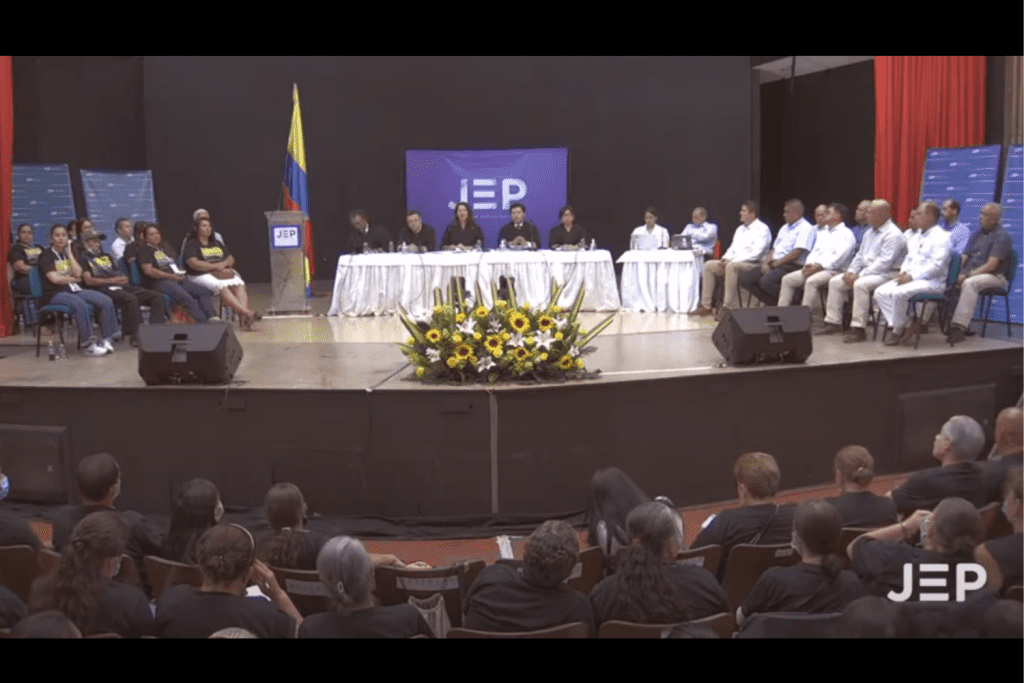
The Special Jurisdiction for Peace (JEP) held an historic hearing in the department of Norte de Santander for the crime against humanity of extrajudicial killings by the Colombian Armed Forces. This hearing is part of a national case (number three) where, so far, the JEP has documented 6,402 civilians extra-judicially executed by State Agents and passed off as combat killings. In this hearing members of the Colombian Army and a civilian acknowledged truth and responsibility for the murders and forced disappearances of 120 civilians, young people lured to Ocaña with the offer of a job, killed and presented as guerrillas killed in combat.
They are charged with the War Crime of homicide of protected persons, which also constituted a Crime Against Humanity of murder and forced disappearance in the face of a generalised and systematic attack against the civilian population. Most of those killed were young men between the ages of 25 and 35 years of age peasant farmers or young people looking for work.
Historic Hearing in Ocaña, Norte de Santander
On 26 April 2022, during an historic hearing organised by the Special Jurisdiction for Peace (JEP), ten retired soldiers admitted, in front of the families of the victims, that they had kidnapped and killed in cold-blood, 120 young people between 2007 and 2008. These young people were civilians that the Colombian army later presented as guerrillas killed in combatant.
They were not the only ones killed in this manner, known in Colombia as “False positives” (Falsos positivos) this is because the Colombian Army used this practice as a way of increasing the number of combat killings. Civil Society Organisations (CSOs) uncovered this systematic practice by the Colombian Army, during the Alvaro Uribe Velez’s Presidency (2002 – 2010). The hearing took place in the same region as the killings, in the department of Norte de Santander, on the border with Venezuela. A general, four colonels, five soldiers, all retired, and a civilian admitted their participation in the kidnappings and cold-blooded murders of 120 young people in the town of Ocaña (100,000 inhabitants).
Some fifty relatives were present for this two-day hearing, where the former soldiers were required to “explain themselves clearly, answer questions and, above all, acknowledge their responsibility, in front of the victims and the country,” according to Judge Catalina Díaz.
The highest-ranking officer to acknowledge his responsibility for the events was Brigadier General Paulino Coronado Gámez, former commander of the 30th Brigade, ‘I offer my absolute willingness to contribute to clarifying the truth, as a means of reparation’.
Corporal Néstor Guillermo Gutiérrez Salazar “We assassinated innocent people (…) those we assassinated were simple peasants,” he also referred to “pressure from the high command” and “demand for results.”
Colonel Rubén Darío Castro Gómez admitted the existence of a “criminal gang”[i] among his men and apologised for demanding the murder of “good people”.
The young people having arrived with the promise of a job were executed on a nearby farm or close to the Ocaña barracks. A practice motivated by an institutional policy of the Army consisting of counting the corpses to inflate its results in the fight against the guerrilla. In exchange, the soldiers received bonuses, permits, promotions and medals.
Others who admitted their responsibility are, Colonels Santiago Herrera Fajardo, Lieutenant Colonels Álvaro Diego Tamayo Hoyos and Gabriel de Jesús Rincón Amado, Major Juan Carlos Chaparro Chaparro, Captain Daladier Rivera Jácome, Second Sergeant Rafael Antonio Urbano Muñoz, Second Sergeant Sandro Mauricio Pérez Contreras, and civilian Alexander Carretero Díaz, who collaborated with the military structures in the illicit actions.
Those who have not admitted their responsibility are Colonels Publio Hernán Mejía and Juan Carlos Figueroa, commanders of the La Popa Battalion during the years 2002 and 2004 and 2004 and 2005. They denied responsibility and were therefore referred to the JEP’s Investigation and Accusation Unit. If Mejía and Figueroa are found guilty, they can be sentenced for to up to 20 years in prison.
[i] Criminal gang is the more recent way that paramilitary groups are being referred to in Colombia. The AUC Paramilitary structure mirrored that of the army structure and carried out some of the worst atrocities in Colombia, often working together with the Armed Forces. However, there were also members of the armed forces who at night put on the insignia of the AUC and directly carried out illegal acts.
